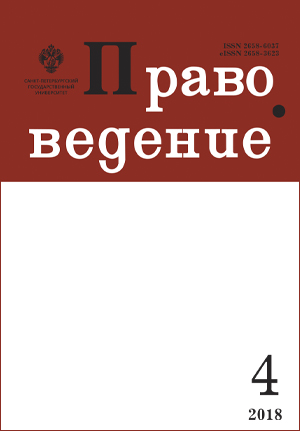Legal instruments of approximation for national legal systems in the context of civil procedure law
DOI:
https://doi.org/10.21638/spbu25.2018.402Abstract
The article offers an overview of the legal instruments existing in the world for approximation of civil procedure law, and also defines the basic concepts in this area (approximation, harmonization, unification). The author analyzes in detail the advantages and disadvantages of each instrument of convergence, and also presents examples of their use (tools) that are available today. The spectrum of legal instruments for the approximation of law makes it possible to trace in the historical perspective the development of the convergence process (from the reception of Roman law to the Principles of the Transnational Civil Procedure in 2004). Such diversity allows us to see how flexible this process can be, depending on the goals of rapprochement proclaimed by states, international organizations, and research teams. Flexibility is also given to the process by its object — the law in its social understanding, as well as by taking into account the economic, social and cultural components of the participating states of the convergence process. The focus on civil procedure law is related to the principle of forum shopping in the international civil process on the one hand and the inadmissibility of large-scale competition of legal (judicial) systems within the framework of integration associations, on the other. A study of modern integration processes shows that such phenomena as the growth of the domestic market and the proclamation of freedom of movement of services and capital, one way or another, lead to a convergence of civil procedure law of the respective states. Restriction of domestic trade is unacceptable due to the very different legal norms and rules of access to justice. Comparable provisions of the procedural legislation of individual member states of the integration association on the protection of rights and legitimate interests in civil proceedings are no less important than the comparable substantive law. The existing experience of European integration, in which the removal of barriers in the judicial protection of the rights of citizens and organizations, ensuring the real accessibility of justice for all members of the integration association, have become the basic and initial elements of building a integrated legal space, is a clear confirmation of this. Analysis of the advantages and disadvantages of various legal instruments for rapprochement, as well as the inclusion of civil procedure law in the list of areas of rapprochement, should be included in the current agenda of Eurasian integration. It should be emphasized that today in domestic procedural science there is almost no discussion on the issue of an adequate model for approximating the legal systems of the EAEU member states, on the advantages and disadvantages of the legal instruments for approximation proposed in the constituent documents. This state of affairs only increases the importance of scientific research in this area, built on the basis of a comparative legal approach, as well as a broad scientific and practical discussion of emerging problems.
Keywords:
approximation of law, civil procedure law approximation, legal instruments of approximation, coordinated legislation, reception (transplantation) of law, international treaty, model law
Downloads
References
Downloads
Published
How to Cite
Issue
Section
License
Articles of "Pravovedenie" are open access distributed under the terms of the License Agreement with Saint Petersburg State University, which permits to the authors unrestricted distribution and self-archiving free of charge.




